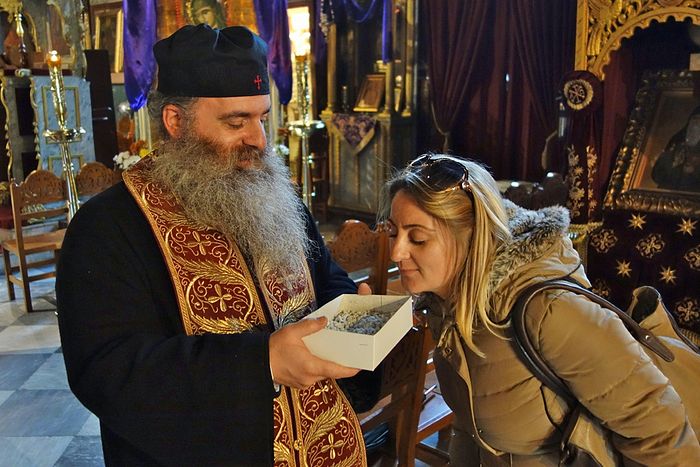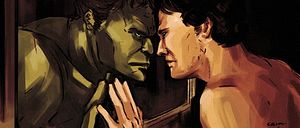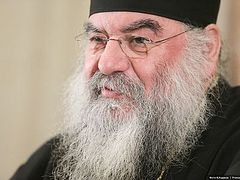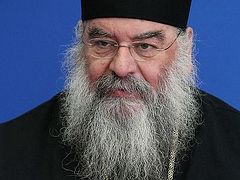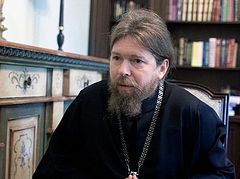Today, brothers and sisters, let’s greet each other with the joy of this feast of the Triumph of Orthodoxy! S Prazdnikom!
Yes, today really is a prazdnik—a feast—although it’s a feast that comes in the midst of our fasting, one that crowns and illumines all the ascetic efforts we have taken on during this past week.
The joyful event we commemorate today, the end of iconoclasm and the restoration of the holy icons in 843, took place on the first Sunday in Lent of that year—I think most of us are familiar with this history.
But the connection between the restoration of the icons and Great Lent goes much deeper, and really touches on the whole purpose of our fast.
St. John the Theologian wrote in his Gospel, No man has ever seen God, but His Son, Christ Jesus, having come in the flesh, He has made Him known unto us (cf. John 1:18). For, as St. Paul teaches, Christ is the image of the invisible God (Col. 1:15). His flesh is a living icon: He is the prototype of the icons of wood and paint that illumine our churches and our homes.
But we can say something more: we also—you and I—are living icons of God. God said: Let us make man in our image and after our likeness (Gen. 1:26). As Fr. Thomas Hopko used to say, we are “images of the image.” For man is made in the image of Christ, the God-Man, and Christ is the image of the Father.
Lord, show us the Father, and we shall be satisfied (John 14:8). These were the words of the Apostle Philip on the night of the Last Supper—the same Philip who, as we heard just now, brought Nathanael to the Lord with the invitation, come and see (John 1:46). Christ’s response to Philip on that night is something we as Orthodox Christians know to be true: he who has seen Christ has seen the Father. And we have seen—we have seen the icons of paint and wood, we have seen the icons of our neighbor who bears God’s image. But having seen, the question is: are we indeed satisfied?
I think most of us believe that there is much that is unsatisfactory about our lives. Evidence of this runs the range from gnawing misgivings or troubled consciences all the way to unrelenting pain, fear, grief, or anger. So what, then, is missing? If communion with God really is the fount of all joy and fulfillment in human existence, indeed, the very reason that we even exist, then why are we not satisfied—we, who, if I may put it this way, have God spoon-fed to us every week? This is the problem that Lent seeks to solve.
It is the problem of disobedience to God’s will—it is the problem of sin.
But there are two related effects of sin that I’d like to mention this morning. First, sin distorts the image of God in ourselves, sometimes very severely; and second, sin impairs our own spiritual vision.
So, first: when we sin, we damage the icon of God that is our body, our soul. Every sinful decision is an act of iconoclasm—an act that damages the sacred image, sometimes in my neighbor, but always in myself. These decisions are at times quite blatant or even dramatic, other times they are subtle and tend to be overlooked. But always they fall short of the dignity that befits the human person, fashioned in God’s image.
As for the second effect of sin: we sang in the Beatitudes a few minutes ago: Blessed are the pure in heart, for they shall see God (Matt. 5:8). Sin clouds our spiritual sight, it blinds the eyes of our heart, so that, standing face to face with God Himself in his icons and in His very Body and Blood, we see ourselves as unsatisfied, empty, alone.
The eye is the lamp of the body, our Lord has taught us. So, if your eye is sound, He said, your whole body will be full of light, but if your eye is not sound, your whole body will be full of darkness (Matt. 6:22–23). What we look at, what we watch: these things affect us on a very deep level. St. Gregory of Nyssa describes the human soul as a mirror. He says: “If gold is held up to a mirror, the mirror assumes the appearance of gold and reflects the splendor of gold’s substance. But if something abominable is held up, its ugliness is impressed on the mirror” (Fourth Homily on the Song of Songs).
Lent is a time for us to become much more conscientious about what impressions we allow to be made on our souls. What do we watch? What do we listen to? Do these things befit our dignity as human beings? Are we cleansing and adorning the image of God within us, or are we obscuring and damaging it?
We may be sure of one thing: while our vision is impaired, Christ’s vision is not. He sees everything. He saw Nathanael under the fig tree before Philip called him. Every secret thought of our heart is laid bare before Him. And that includes all our ingratitude, all our disobedience, all our efforts to push God out of our lives so that we may be as gods. He sees all this much more clearly than we do. And despite all this, He loves us. Deeply. And He is the true iconographer, whose skilled hands are restoring the image in us which we, by our own will, have desecrated so many times.
So I would like to leave you today with the words of this beautiful troparion from the Paschal canon (ode one) that we’ll sing with such joy six weeks from now, on Pascha night, words which I think perfectly encapsulate the theme and the goal of Great Lent:
“Let us purify our senses, and we shall see Christ, shining in the unapproachable Light of his resurrection, and we shall clearly hear him say, ‘Rejoice!’ as we sing the song of victory!” Amen.
Preached at Divine Liturgy on the Sunday of Orthodoxy, March 20, 2016, at St. Vladimir’s Orthodox Theological Seminary, Yonkers, New York

